This feature is currently in Beta and may be subject to change. This documentation is for customers who are currently part of the pilot.
When searching in Fuse Flow for Microsoft Teams, you can apply filters to search results to refine and make them more relevant. You can filter by item type, as well as sort the results by popularity, recency and relevancy. To access the filters, click the Filters icon in the right-hand corner of the search results.
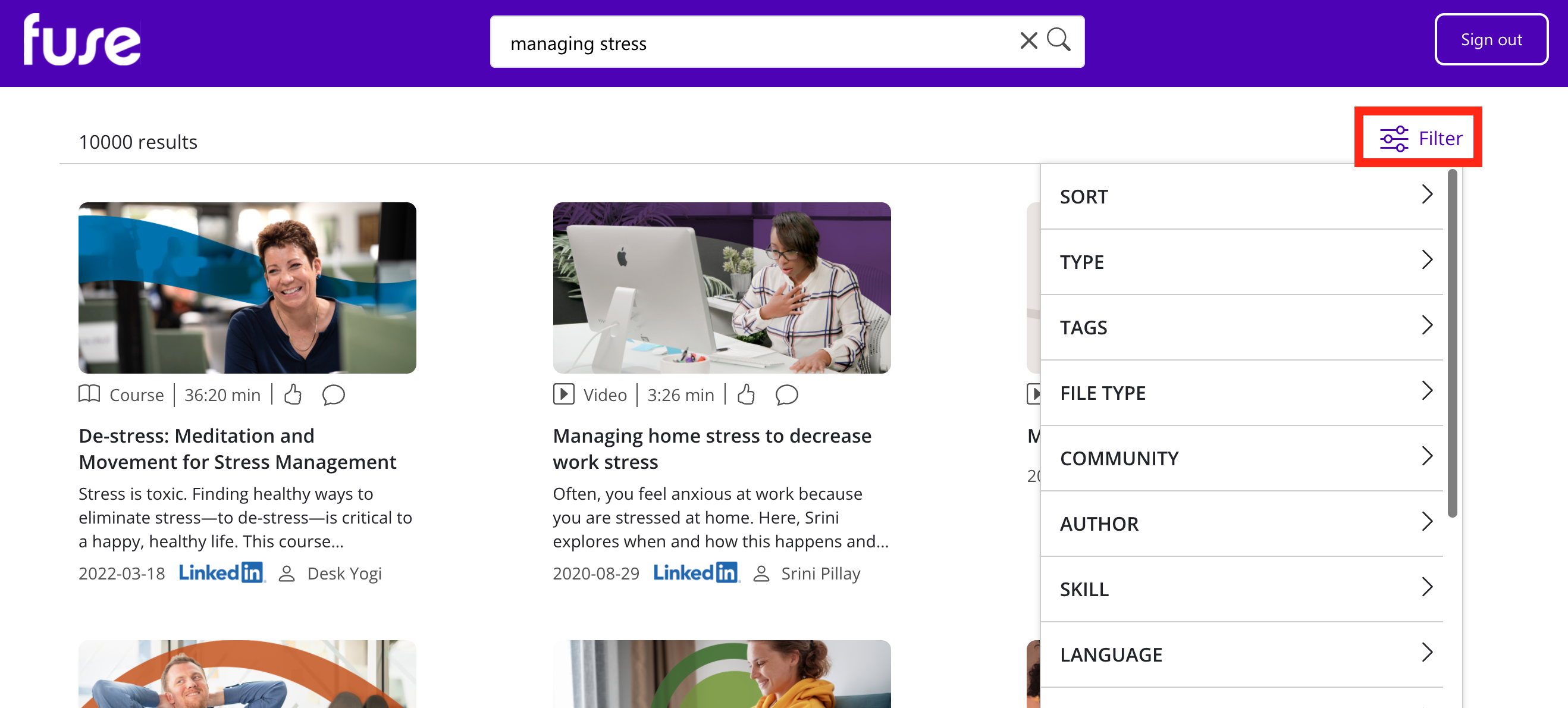
Sorting by relevancy, recency and popularity
You can sort search results using the Sort filter.
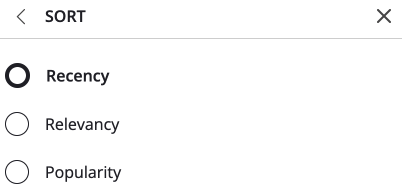
The following options can be selected in the Sort list:
|
Filter |
Description |
|---|---|
|
Relevancy |
Sorts the search results to show the most relevant items, based on the search query you have entered and the facets/filters you have applied to the results. |
|
Recency |
Sorts the items in search results based on how recently they were updated.The most recently updated items appear at the top of the search results. |
|
Popularity |
Sorts the items based on how many likes, views, comments and shares they have received. The most popular items appear at the top of the search results. |
Filtering by type
The Type list allows you to filter by item type.
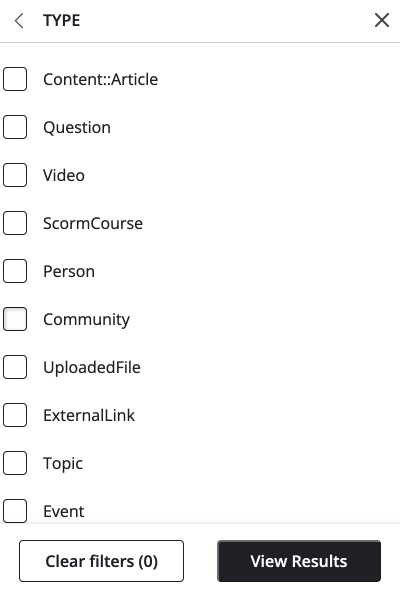
If an item exists in multiple communities, it only appears once in the search results.
Available types
The following types are available in the Type list:
Relevant facets can be applied to each item type to help further refine the results. For more information on each facet, see the Facets section below.
|
Type |
Description |
Available facets |
|---|---|---|
|
Article |
Allows you to filter the search results to show articles that match the entered query. If a video is embedded in an article, search does not count the Video Duration, only the read time (word count) of the article. The embedded video and the transcript for that video do not influence the article's read time. |
The following facets can be applied to articles in search results:
|
|
Community |
Allows you to filter the search results to show communities that match the entered query.
|
The following facets can be applied to communities in search results:
|
|
ScormCourse |
Allows you to filter the search results to show SCORM courses that match the entered query. |
The following facets can be applied to SCORM courses in search results:
|
|
Event |
Allows you to filter the search results to show events that match the entered query. |
The following facets can be applied to events in search results:
|
|
UploadedFile |
Allows you to filter the search results to show files, such as documents, presentations and PDFs that match the entered query. |
The following facets can be applied to uploaded files in search results:
|
|
ExternalLink |
Allows you to filter the search results to show external links that match the entered query. |
The following facets can be applied to external links in search results:
|
|
Person |
Allows you to filter the search results to show Fuse users that match the entered query. |
The following facets can be applied to Fuse users in search results:
|
|
Question |
Allows you to filter the search results to show questions that match the entered query. |
The following facets can be applied to questions in search results:
|
|
Topic |
Allows you to filter the search results to show topics that match the entered query. |
The following facets can be applied to topics in search results:
|
|
Video |
Allows you to filter the search results to show videos that match the entered query. If a video is embedded in an article, search does not count the Video Duration, only the read time (word count) of the article. The embedded video and the transcript for that video do not influence the article's read time.
|
The following facets can be applied to videos in search results:
|
|
LearningPlan |
Allows you to filter the search results to show learning plans that match the entered query. |
The following facets can be applied to learning plans in search results:
|
Facets
When you filter the search results by item type, facets relevant to that item type appear in the Filters list. When selected, these facets help further refine the search results. For example, if you have selected the Videos type, you might want to apply the Video Duration facet so that the search results only return videos of a certain duration. Selecting the < 5 mins option for this facet means that only videos with a duration of 5 minutes or less are returned.
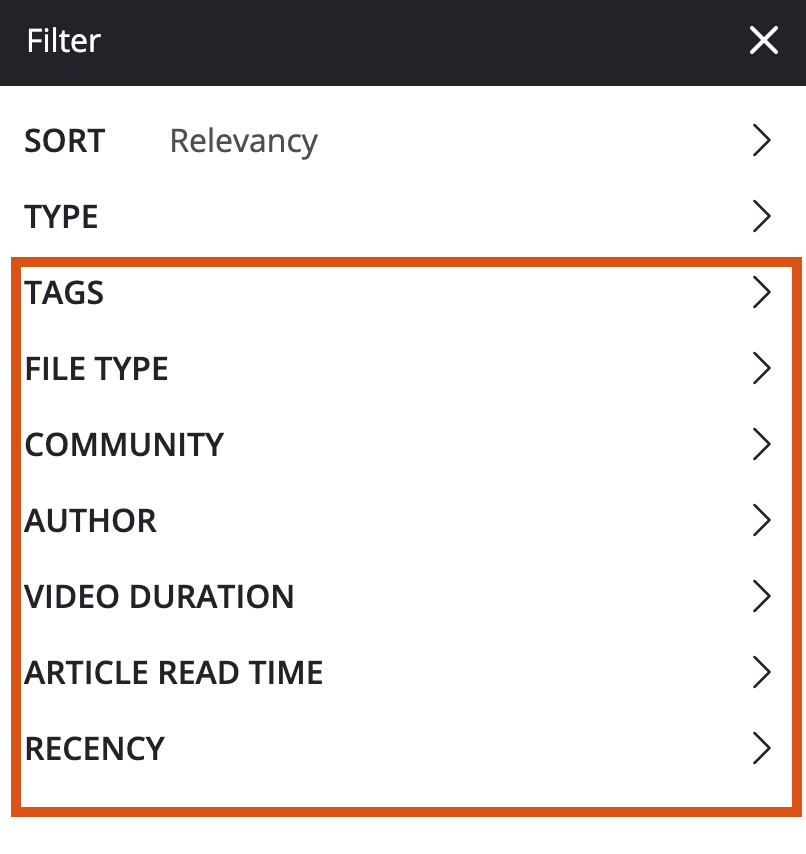
The following facets are available:
|
Facet |
Description |
|---|---|
|
Recency |
Allows you to filter items by how recently they were created or updated. 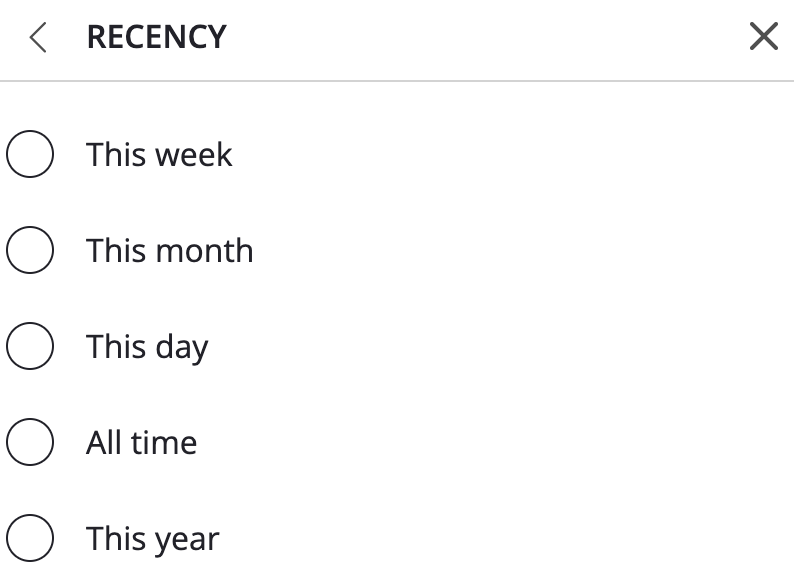
Content items that have been recently updated are always ranked higher in search results. |
|
Community |
Allows you to filter the results so that only content from a particular community is returned. For example, if there is a community in the list called 'Sales & Marketing', you might select this option so that only content from this community is shown. 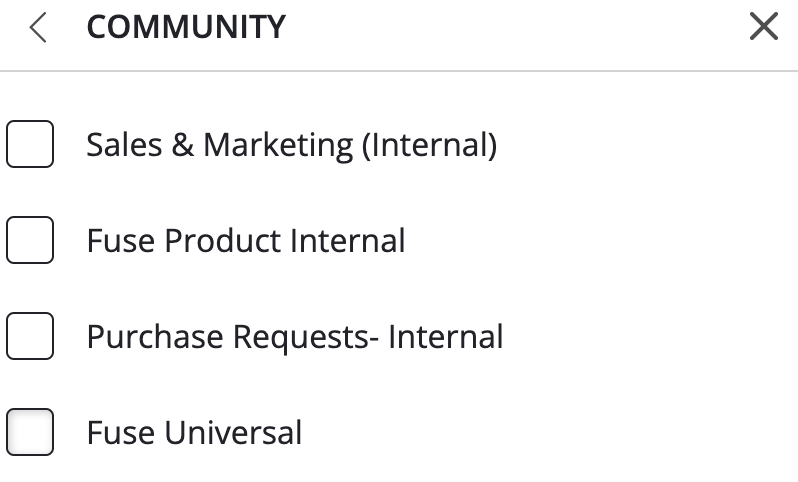
|
|
Author |
Allows you to filter items of content, such as articles, files, links, questions, and videos by author. 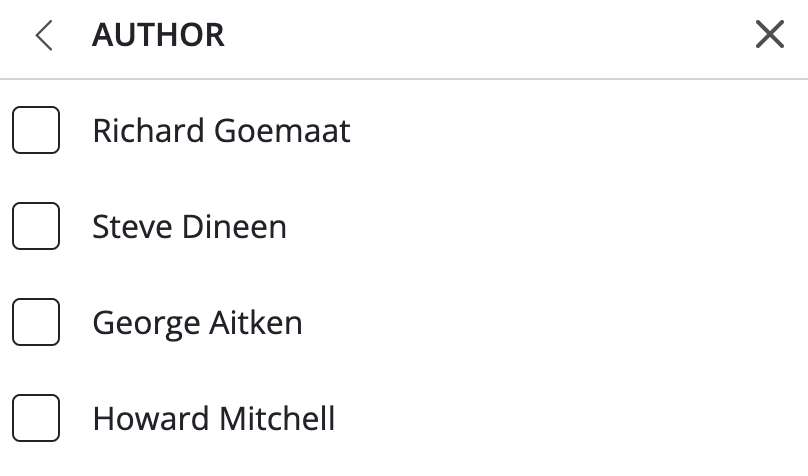
|
|
Tags |
Allows you to filter by tags that have been added to the content. For example, a 'time' tag may have been added to the content manually by the author or automatically through the Knowledge Intelligence engine. If you select this tag, only content that has this tag is displayed in the search results. 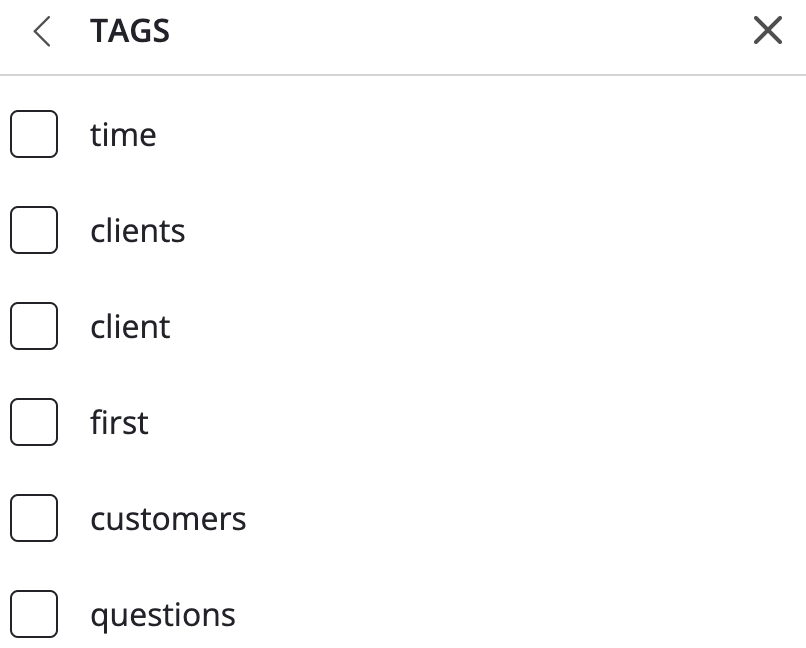
|
|
Video Duration |
Allows you to filter videos by duration. For example, you might want to filter the results to only show videos with a duration of 5 minutes or less. The following options are available:
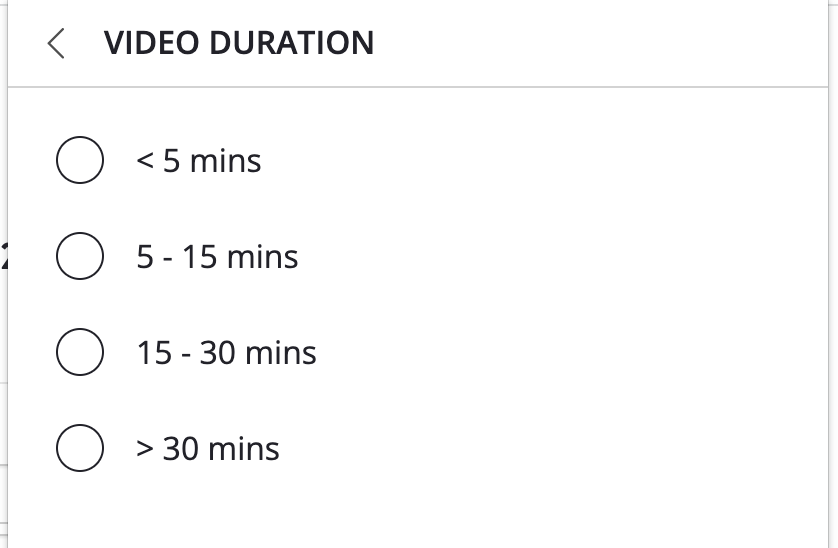
If a video is embedded in an article, search does not count the Video Duration, only the read time (word count) of the article. The embedded video and the transcript for that video do not influence the article's read time. |
|
Article Read Time |
Allows you to filter articles by how long it takes to read them. For example, you might want to filter the results to only show articles that have a read time of 30 mins or more. The following options are available:
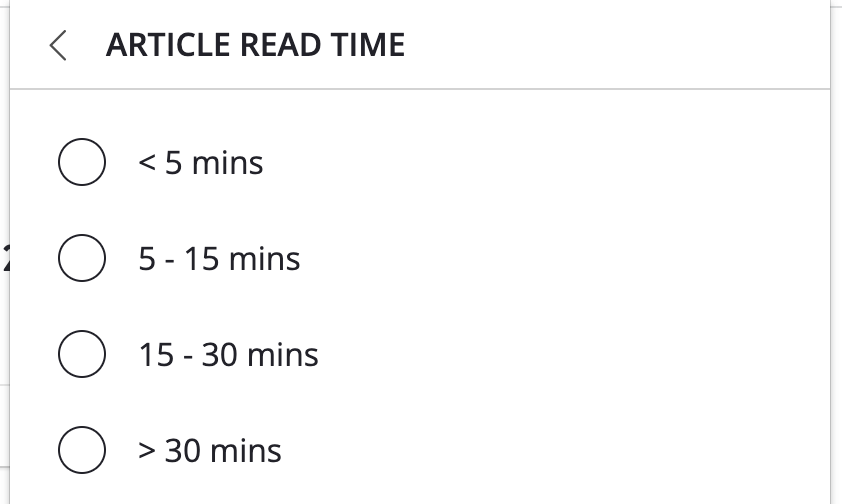
|
|
Event Location |
Allows you to filter the list of events by location. An event location might be the address of a physical location or a link to a virtual meeting room, such as in Zoom, Microsoft Teams or Google Meet. |
|
Event Host |
Allows you to filter the list of events by event host. For example, you might only want to return events hosted by a particular person. 
|
|
File Type |
Allows you to filter the list of uploaded files by file type. 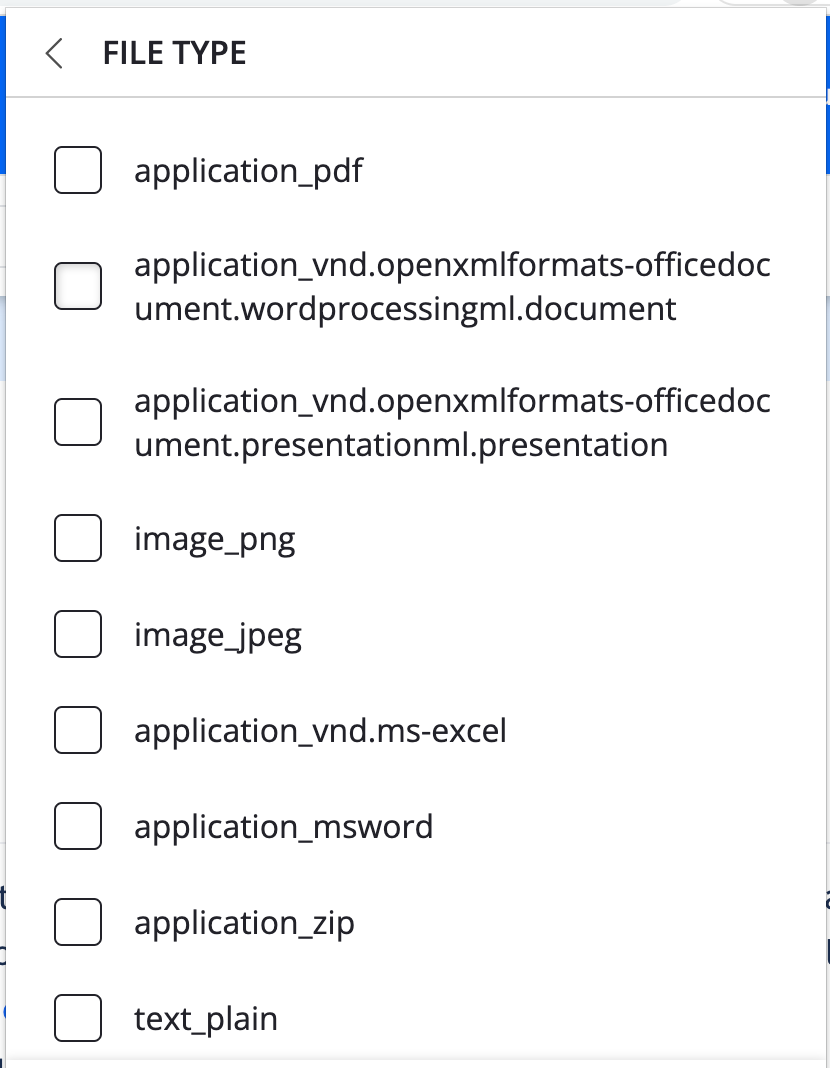
|
